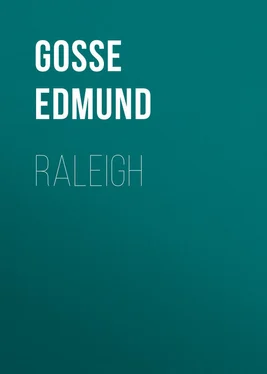Edmund Gosse - Raleigh
Здесь есть возможность читать онлайн «Edmund Gosse - Raleigh» — ознакомительный отрывок электронной книги совершенно бесплатно, а после прочтения отрывка купить полную версию. В некоторых случаях можно слушать аудио, скачать через торрент в формате fb2 и присутствует краткое содержание. Жанр: foreign_antique, foreign_prose, на английском языке. Описание произведения, (предисловие) а так же отзывы посетителей доступны на портале библиотеки ЛибКат.
- Название:Raleigh
- Автор:
- Жанр:
- Год:неизвестен
- ISBN:нет данных
- Рейтинг книги:3 / 5. Голосов: 1
-
Избранное:Добавить в избранное
- Отзывы:
-
Ваша оценка:
- 60
- 1
- 2
- 3
- 4
- 5
Raleigh: краткое содержание, описание и аннотация
Предлагаем к чтению аннотацию, описание, краткое содержание или предисловие (зависит от того, что написал сам автор книги «Raleigh»). Если вы не нашли необходимую информацию о книге — напишите в комментариях, мы постараемся отыскать её.
Raleigh — читать онлайн ознакомительный отрывок
Ниже представлен текст книги, разбитый по страницам. Система сохранения места последней прочитанной страницы, позволяет с удобством читать онлайн бесплатно книгу «Raleigh», без необходимости каждый раз заново искать на чём Вы остановились. Поставьте закладку, и сможете в любой момент перейти на страницу, на которой закончили чтение.
Интервал:
Закладка:
Such were the sources of an opulence which we must do Raleigh the credit to say was expended not on debauchery or display, but in the most enlightened efforts to extend the field of English commercial enterprise beyond the Atlantic. We need not suppose him to have been unselfish beyond the fashion of his age. In his action there was, no doubt, an element of personal ambition; he dreamed of raising a State in the West before which his great enemy, Spain, should sink into the shade, and he fancied himself the gorgeous viceroy of such a kingdom. His imagination, which had led him on so bravely, gulled him sometimes when it came to details. His sailors had seen the light of sunset on the cliffs of Roanoke, and Raleigh took the yellow gleam for gold. He set his faith too lightly on the fabulous ores of Chaunis Temotam. But he was not the slave of these fancies, as were the more vulgar adventurers of his age. More than the promise of pearls and silver, it was the homely products of the new country that attracted him, and his captains were bidden to bring news to him of the fish and fruit of Virginia, its salts and dyes and textile grasses. Nor was it a goldsmith that he sent out to the new colony as his scientific agent, but a young mathematician of promise, the practical and observant Thomas Hariot.
Some personal details of Raleigh's private life during these two years may now be touched upon. He was in close attendance upon the Queen at Greenwich and at Windsor, when he was not in his own house in the still rural village of Islington. In the summer of 1584, probably in consequence of the new wealth his broad-cloth patent had secured him, he enlarged his borders in several ways. He leased of the Queen, Durham House, close to the river, covering the site of the present Adelphi Terrace. This was the vast fourteenth-century palace of the Bishops of Durham, which had come into possession of the Crown late in the reign of Henry VIII. Elizabeth herself had occupied it during the lifetime of her brother, and she had recovered it again after the death of Mary. Retaining certain rooms, she now relinquished it to her favourite, and in this stately mansion as his town house Raleigh lived from 1584 to 1603. In spite of his uncertain tenure, he spent very large sums in repairing 'this rotten house,' as Lady Raleigh afterwards called it.
Some time between December 14, 1584, and February 24, 1585, Raleigh was knighted. On the latter date we find him first styled Sir Walter, in an order from Burghley to report on the force of the Devonshire Stannaries. His activities were now concentrated from several points upon the West of England, and he became once more identified with the only race that ever really loved him, the men of his native Devonshire. In July he succeeded the Earl of Bedford as Lord Warden of the Stannaries; in September he was appointed Lieutenant of the County of Cornwall; in November, Vice-Admiral of the two counties. He, appointed Lord Beauchamp his deputy in Cornwall, and his own eldest half-brother, Sir John Gilbert of Greenway, his deputy in Devonshire. In the same year, 1585, he entered Parliament as one of the two county members for Devonshire. As Warden of the Stannaries he introduced reforms which greatly mitigated the hardships of the miners.
It is pleasanter to think of Raleigh administering rough justice from the granite judgment-seat on some windy tor of Dartmoor, than to picture him squabbling for rooms at Court with 'Pecora Campi,' or ogling a captious royal beauty of some fifty summers, Raleigh's work in the West has made little noise in history; but it was as wholesome and capable as the most famous of his exploits.
In March, 1586, Leicester found himself in disgrace with Elizabeth, and so openly attributed it to Raleigh that the Queen ordered Walsingham to deny that the latter had ceased to plead for his former patron. Raleigh himself sent Leicester a band of Devonshire miners to serve in the Netherlands, and comforted him at the same time by adding, 'The Queen is in very good terms with you, and, thanks be to God, well pacified. You are again her "Sweet Robin."' It seems that the strange accusation had been made against Raleigh that he desired to favour Spain. This was calculated to vex him to the quick, and we find him protesting (March 29, 1586): 'I have consumed the best part of my fortune, hating the tyrannous prosperity of that State, and it were now strange and monstrous that I should become an enemy to my country and conscience.' Two months later he was threatened with the loss of his post as Vice-Admiral if he did not withdraw a fleet he had fitted out to harass the Spaniards in the Newfoundland waters. About the same time he strengthened his connection with the Leicester faction by marrying his cousin, Barbara Gamage, to Sir Philip Sidney's younger brother Robert. This lady became the grandmother of Waller's Sacharissa. The collapse of the Virginian colony was an annoyance in the summer of this year, but it was tempered to Raleigh by the success of another of his enterprises, his fleet in the Azores. One of the prizes brought home by this purely piratical expedition was a Spanish colonial governor of much fame and dignity, Don Pedro Sarmiento. Raleigh demanded a ransom for this personage, and while it was being collected he entertained his prisoner sumptuously in Durham House.
On October 7, 1586, Raleigh's old friend Sir Philip Sidney closed his chivalrous career on the battle-field at Zutphen. Raleigh's solemn elegy on him is one of the finest of the many poems which that sad event called forth. It blends the passion of personal regret with the dignity of public grief, as all great elegiacal poems should. One stanza might be inscribed on a monument to Sidney:
England doth hold thy limbs, that bred the same;
Flanders thy valour, where it last was tried;
The camp thy sorrow, where thy body died;
Thy friends thy want; the world thy virtues' fame.
This elegy appeared with the rest in Astrophel in 1595; but it had already been printed, in 1593, in the Phœnix Nest , and as early as 1591 Sir John Harington quotes it as Raleigh's.
It was not till the following spring that Raleigh took possession of certain vast estates in Ireland. The Queen had named him among the 'gentlemen-undertakers,' between whom the escheated lands of the Earl of Desmond were to be divided. He received about forty-two thousand acres in the counties of Cork, Waterford, and Tipperary, and he set about repeopling this desolate region with his usual vigour of action. He brought settlers over from the West of England, but these men were not supported or even encouraged at Dublin Castle. 'The doting Deputy,' as Raleigh calls him, treated his Devonshire farmers with less consideration than the Irish kerns, and although it is certain that of all the 'undertakers' Raleigh was the one who, after his lights, tried to do the best for his land, his experience as an Irish colonist was on the whole dispiriting. By far the richest part of his property was the 'haven royal' of Youghal, with the thickly-wooded lands on either side of the river Blackwater. He is scarcely to be forgiven for what appears to have been the wanton destruction of the Geraldine Friary of Youghal, built in 1268, which his men pulled down and burned while he was mayor of the town in 1587. Raleigh's Irish residences at this time were his manor-house in Youghal, which still remains, and Lismore Castle, which he rented, from 1587 onwards, of the official Archbishop of Cashel, Meiler Magrath.
We have now reached the zenith of Raleigh's personal success. His fame was to proceed far beyond anything that he had yet gained or deserved, but his mere worldly success was to reach no further, and even from this moment sensibly to decline. Elizabeth had showered wealth and influence upon him, although she had refrained, at her most doting moments, from lifting him up to the lowest step in the ladder of aristocratic preferment. But although her favour towards Raleigh had this singular limit, and although she kept him rigidly outside the pale of politics, in other respects her affection had been lavish in the extreme. Without ceasing to hold Hatton and Leicester captive, she had now for five years given Raleigh the chief place in her heart. But, in May 1587, we suddenly find him in danger of being dethroned in favour of a boy of twenty, and it is the new Earl of Essex, with his petulant beauty, who 'is, at cards, or one game or another, with her, till the birds sing in the morning.' The remarkable scene in which Essex dared to demand the sacrifice of Raleigh as the price of his own devotion is best described by the new favourite in his own words. Raleigh had now been made Captain of the Guard, and we have to imagine him standing at the door in his uniform of orange-tawny, while the pert and pouting boy is half declaiming, half whispering, in the ear of the Queen, whose beating heart forgets to remind her that she might be the mother of one of her lovers and the grandmother of the other. Essex writes:
Читать дальшеИнтервал:
Закладка:
Похожие книги на «Raleigh»
Представляем Вашему вниманию похожие книги на «Raleigh» списком для выбора. Мы отобрали схожую по названию и смыслу литературу в надежде предоставить читателям больше вариантов отыскать новые, интересные, ещё непрочитанные произведения.
Обсуждение, отзывы о книге «Raleigh» и просто собственные мнения читателей. Оставьте ваши комментарии, напишите, что Вы думаете о произведении, его смысле или главных героях. Укажите что конкретно понравилось, а что нет, и почему Вы так считаете.












